How a Bench Custom Grain Cleaner More Than Pays for Itself
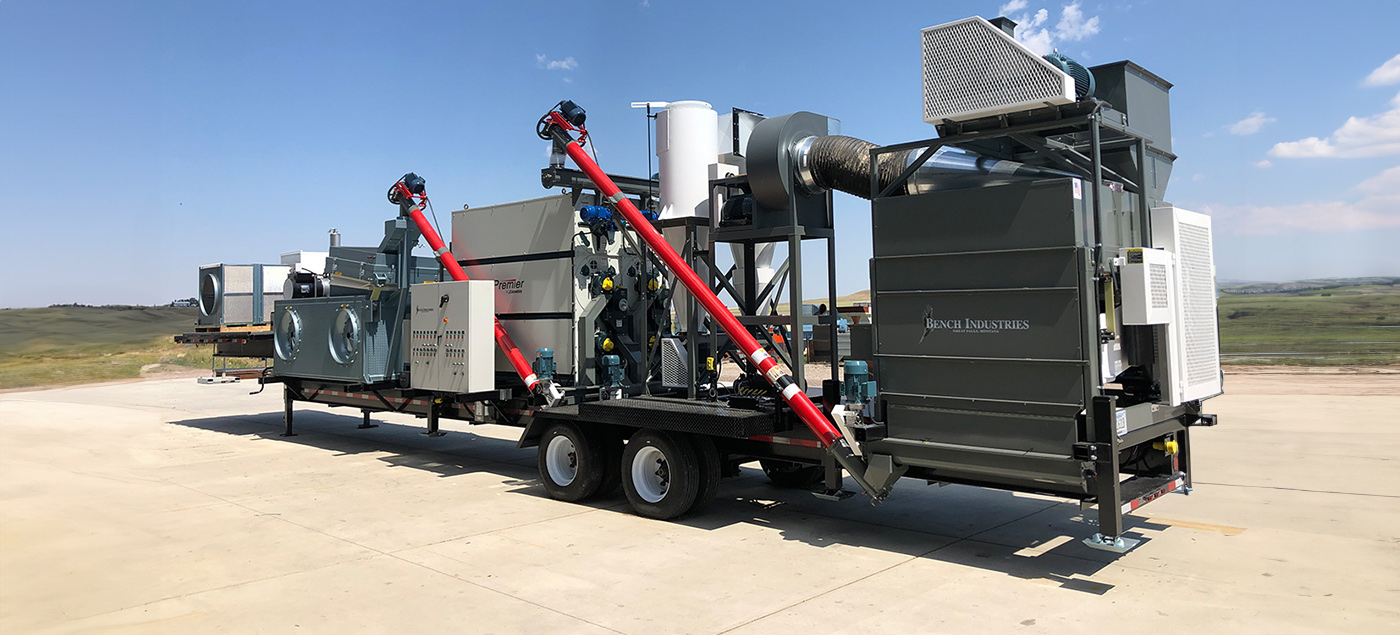
It’s a scene that’s played out on farm after farm across Canada. Flaman Sales Specialist James Vanbeselaere positions your input and output augers, sets four levelling jacks, flips a switch on the central electric panel, and another farmer is in business.
If you’ve read our other Bench Custom Grain Cleaners Blog, you know that the business of on-farm grain cleaning makes good long-term economic sense. That blog discussed the savings you could bank, potentially over decades. With James’s help, this one details the ease, versatility, and benefits of operating your own personally customized cleaner.
Easy Start Up
“They usually reach us somewhat assembled, so we can pull it out to the customers already set up to go,” James explains. Very little time elapses between when it arrives in your yard and when it starts running - just enough to complete the wiring and the steps outlined above.
Ease of Use
The first goal of customizing a Bench cleaner is customer convenience. The central electric panel gives users quick, easy-to-reach, and unobstructed access to the Variable Frequency Drive (VFD) controls that govern their intake and output auger speeds.
Customers are also likely to admire the convenient method Bench devised for changing screens.
“The A1door latch system is unlike some cleaners that have grader shells you have to unbolt to take off,” James explains. “You wouldn’t have to do that with an Airens screen.” The Bench method is an easy slide-out, slide-back-in process, as James demonstrates in this video.
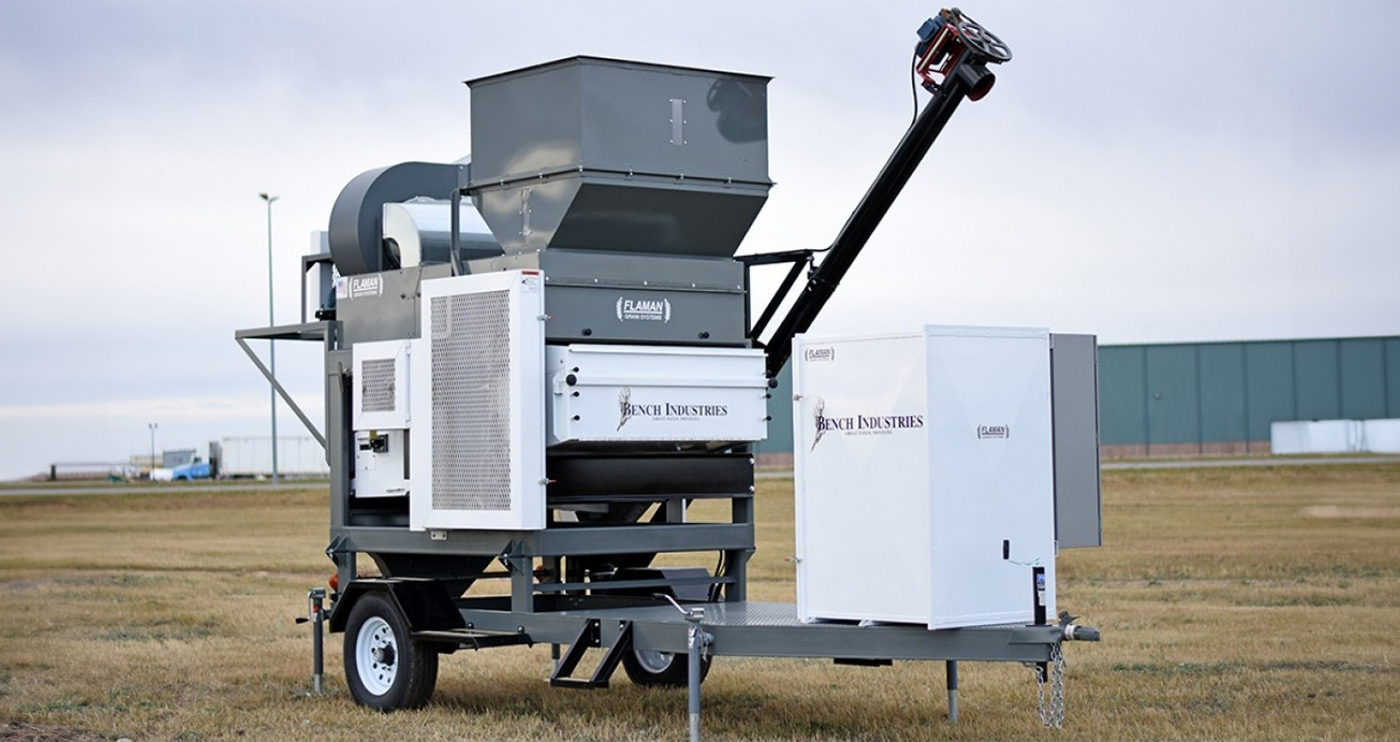
Dockage doesn’t stand a chance.
“The Bench 54 by 72-inch portable grain cleaner would probably be our most popular unit,” James says. That unit is equipped with components from another manufacturer, Premier Grain Cleaner of Minneapolis-Saint Paul, Minnesota. Like other Bench models, it does just about everything you could ask to winnow out everything but the top-quality grain you want.
Lighter material is immediately vacuumed away by the Cyclo air system pre-aspirator. Vibrating shaker shoes vibrate the scalp deck, grade deck, and sift deck. Each shoe sits above bouncing balls that help move materials to screens where they either fall through to the next layer or are taken off as dockage. That and a final round of Cyclo aspiration effectively removes everything from straw and rocks to fine chaff.
A Team of Machines
There’s even more you can do to deliver pristine commodities, thanks to Bench’s modular extensions. If you’re cleaning barley, you may want to start with a Bench de-bearder to improve your commodity’s flow-ability going into the grain cleaner - and its test weight afterward.
Once you’ve filtered the impurities out of your grain, you can take out the broken kernels using an indent screen. This screen is wrapped around a rotating drum, using centrifugal force to hold kernels of a desired length in the screen’s pockets while smaller kernels fall off the drum and are taken off as dockage. It’s a popular item, for good reason, as James explains.
“There were some grain cleaners we sold in La Crête, Alberta that had just Airens screens with indents because he’s mainly cleaning wheat. They grow a lot of wheat and canola up there.” Indent screens are ideal for longer-grain crops like wheat, which has been the commodity that creates the most demand for grain cleaning, James says.
Portable Possibilities
Wheat may be the crop most customers want to clean, but Bench provides options for a wide spectrum of cereal, oilseed, and pulse crops. Priding itself on versatility as well as portability, Bench offers cleaning equipment designed to handle barley, beans, canola, chickpeas, flax, oats, soybeans and sunflowers.
Flaman also has its own screen distribution facility in Saskatoon. Like Bench, we offer an inventory that’s carefully selected to take excellent care of the crops you put in your bins.
Kind to Your Commodities. Easy on Electricity.
“It’s a gentle feed,” James says of Bench cleaners’ easy-going stability. Those carefully set levelling jacks prevent a great deal of commodity damage by offsetting uneven terrain, but Bench took its smooth, crop-friendly operation an extra step.
“There are eccentrics underneath that provide a counterbalance,” James says, adding mention of another important benefit: “Once the shaker’s moving back and forth, little horsepower is required to move the tray, because of the momentum. So, guys don’t have to worry about having a big enough power supply to run these.”
Like to Know More about Operating Your Own Custom Grain Cleaner?
Flaman Grain Systems experts are ready to show you in-stock Bench Grain Cleaners and answer any questions you have. Call or visit your nearest Flaman location to discuss effective, economical solutions to your farm’s specific requirements.
Posted by Jeff Brown on Nov 19, 2024 in Product Information
Tagged Grain Cleaning
The Benefits of Customized On-Farm Grain Cleaning
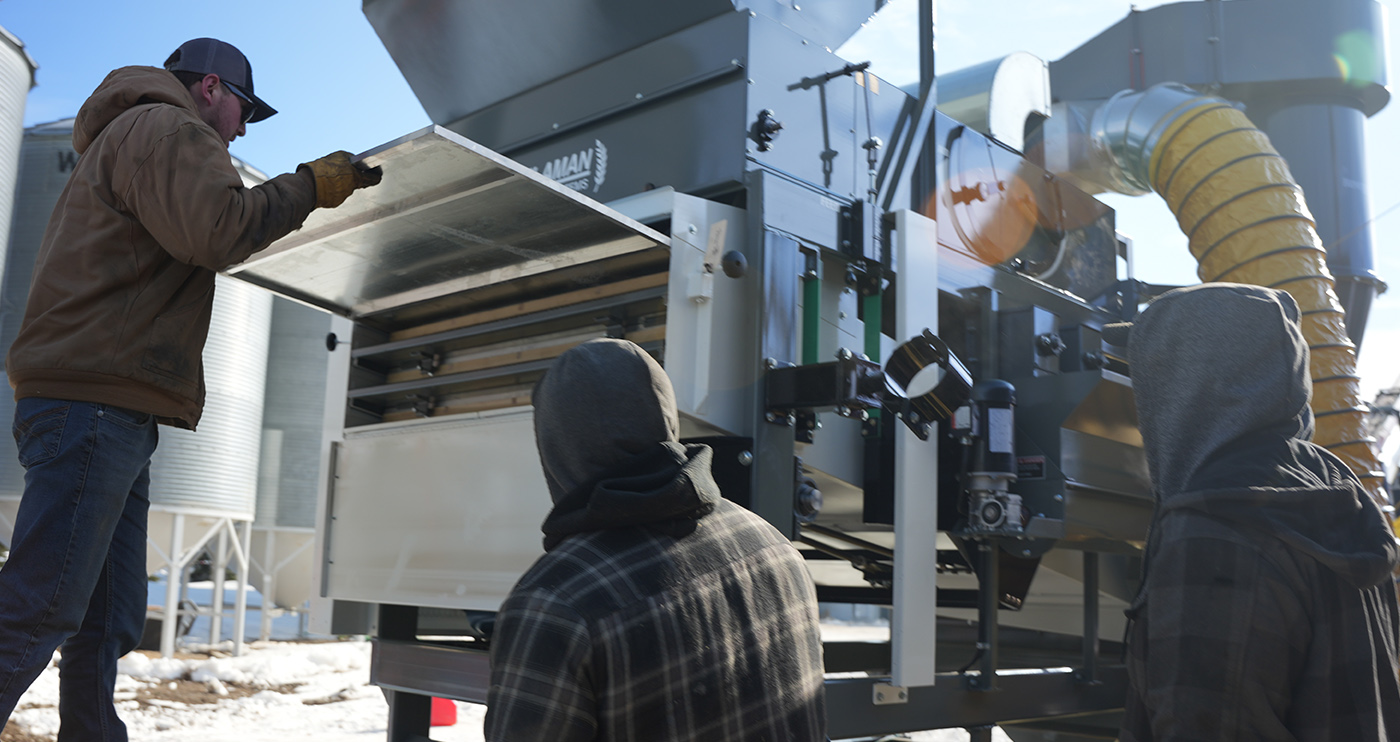
"Every farm’s going to be different,” says James Vanbeselaere. “Every area will be different, depending on what they're trying to clean.” As a Flaman Sales Specialist who’s installed and fired up a lot of customized Bench grain cleaners for enterprising customers, he should know.
What he’s showing farmers is a viable alternative to the transport distances, fuel costs, and unloading cues they can see taking their commodities to seed cleaning plants.
Grain Cleaning Comes Home
“You're just paying an expense to have the other guy clean it,” James says. “A lot of custom cleaners charge about a dollar a bushel. We have customers that clean 10 to 20,000 bushels a year. So, they're spending, you know, upwards of 20 or $30,000 just to have their own grain cleaned. So why not keep that money in your own pocket and put it towards your own system? You'll be building an asset out of it."
That’s why Flaman Grain Systems took the next logical step in the evolution of grain cleaning. It forged a partnership with Great Falls, Montana manufacturer Bench Industries to make on-farm grain cleaning a viable option for more producers.
“That relationship was already formed before I started at Flaman,” James says. “So, I guess I’ve just continued it. They fit our needs. We can sell on-farm units in the right sizes for on-farm use.”
Identifying Your Needs. Formulating Your Solutions.
Bench builds their quality grain cleaners to customer specifications, often using farmer-supplied commodity samples as a starting point. They offer a variety of mobile and mini grain cleaners, plus accessories like the popular Airens screens.
“Bench will do a lot of the customization themselves.” James explains. A customer’s specifically recommended combination could start with a portable or modular air screen machine, mini air screen machine, mid-size grain and seed cleaner, or mobile screen machine and include a vital accessory like a debearder/rethrasher, vibratory conveyor, or separator.
Long-Term Reliability
The tens of thousands of dollars farmers can save doing their own grain cleaning every year can multiply over decades. Flaman has a record of choosing grain cleaners based on their potential long-term durability – choices that have often panned out impressively.
“We’ve got a lot of cleaners that have been around for a long time,” James says. “Twenty, thirty, forty years old. They last.”
“VFD” spells power savings and convenience.
Bench custom grain cleaners feature a frequency drive (VFD) that can reduce power consumption by up to 70%. It’s connected to the electrical panel, a single central point of power connection that gives you speed control over your incoming and outgoing augers.
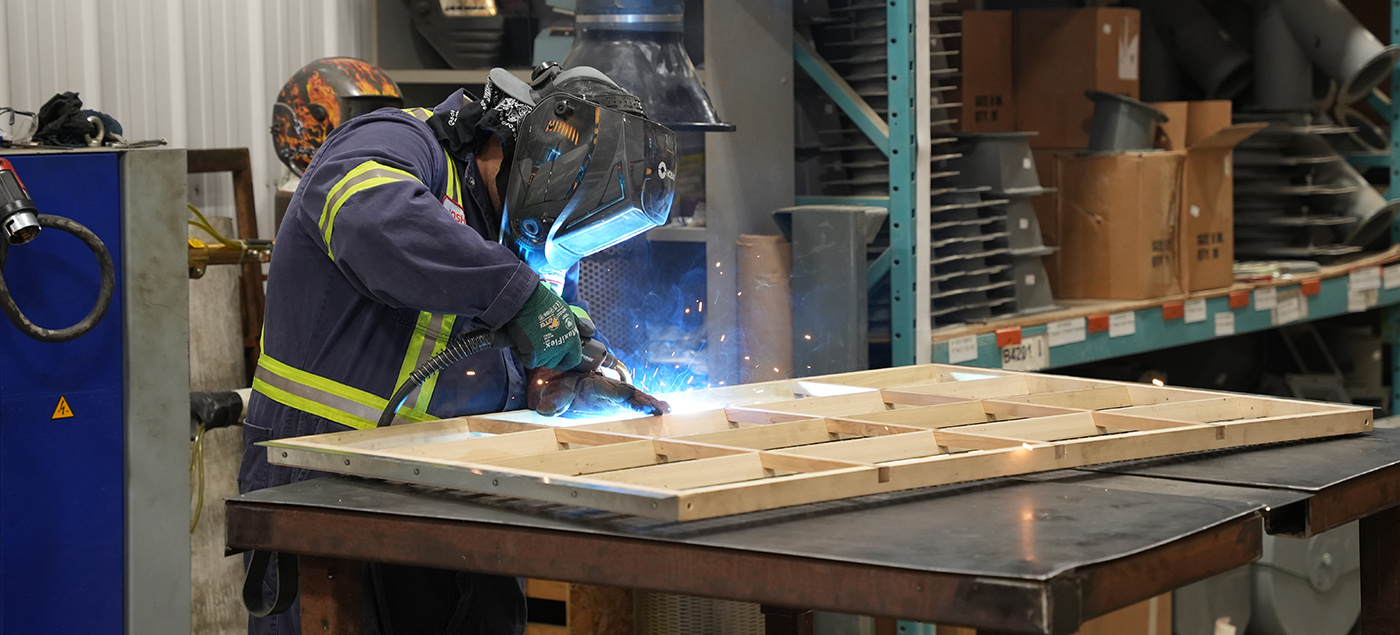
Nationwide Home Grain Cleaning
Wheat farmers are most likely to take up what Flaman and Bench have to offer. There is also demand for cleaning other commodities. Bench equipment can process other cereal crops like oats and barley, as well as oilseed crops like canola, flax, soybeans, and sunflowers, and pulse crops like peas, chickpeas, and beans.
With Flaman operating its own screen distribution facility in Saskatoon, the two-company partnership can help diverse farming operations across the Prairies – and beyond. We try to be coast to coast, all across Canada.” Wherever they go, these units carry their value with them.
Cost Savings, Care, and Convenience
“We’re pretty competitive in the price range,” James says. But he adds the real economic benefit is the money and time farmers can save. “They’re cleaning their own grain, so they’re not paying for it.”
That’s before a slew of design benefits that make grain cleaning a more pleasant process from the moment your unit arrives on your farm. You can read about them here.
James answers two final questions you might already be asking.
What kind of customer does Flaman believe is a good fit for a Bench custom grain cleaner? With the variety of options Bench offers and the spectrum of commodities and working conditions they can handle, there’s only one answer:
“We’re open to everyone.”
So, how do you find out if a Bench custom grain cleaner is right for you?
“Contact your local farm and sales Rep.”
You can do so by calling or visiting your nearest Flaman location. Our grain cleaning experts will be happy to introduce you to the convenience, benefits, and economy of owning your own Bench custom grain cleaning system.
Posted by Jeff Brown on Nov 19, 2024 in Product Information
Tagged Grain Cleaning
Kwik Kleen Grain Separators. More than Dockage Removal.
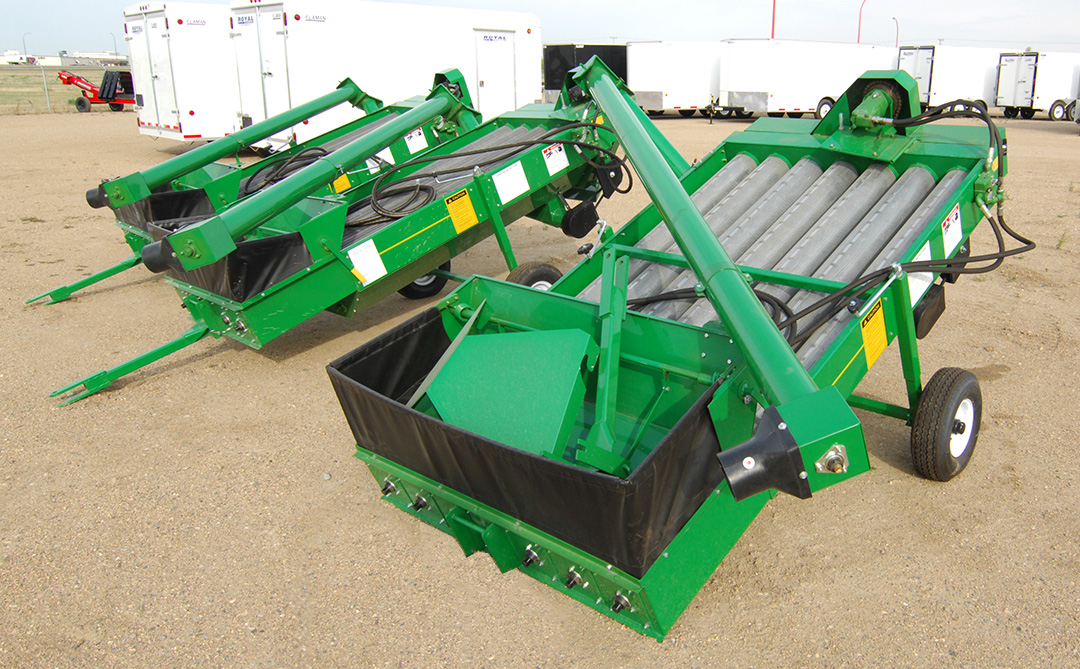
When you’re trying to take off a crop in a limited amount of time, there are some things you just don’t want in your bin or your transport truck. Dockage and small seeds from weeds like Kochia or volunteer canola can compromise the condition of your harvest while costing you extra time and money. But there’s something you can do about it.
Removing small seeds will increase airflow, which will speed up your drying time and reduce your risk of heating. Taking out chaff, thin kernels, and other forms of dockage will increase your bushel weight and quality, lowering your transport costs.
Kwik Kleen's high-capacity five-auger 572 and seven-auger 772 grain separators handle these tasks quickly and efficiently. They also help with farming techniques that maximize your land’s productivity.
They remove what you don’t want. The Kwik Kleen system is ideal for separating large and small materials, earning it a reputation for superior dockage removal. It’s designed to separate light product with advanced features for tasks like sizing barley and taking thins out of cereals. This will increase your bushel weight, and lower transport costs, because you’re carrying only the grain you want to ship and nothing else.
They’re made for intercropping. Planting two compatible crops in the same ground at the same time can yield several nutritional benefits. When the time comes to separate them, a Kwik Kleen is well suited to separating large and small commodities like barley and canola, chickpeas and flax, and peas and canola. They’re also helpful if you’re sorting out biproducts for other uses, like dockage for livestock feed.
Cost-effective, high-capacity, and efficient Kwik Kleen grain cleaners excel at dockage separation but can be easily adjusted to perform multiple grain separating tasks.
There’s much more to the Kwik Kleen. Mitch from Flaman walks you through the electrical or hydraulic drive option, available auger sizes, and the variety of screen options available. For more information, call or visit your nearest Flaman location.
Posted by Jeff Brown on Oct 7, 2024 in Product Information
Tagged Kwik Kleen, Grain Cleaning
Be ready for harvest 2022: Summer is the time to build your bins & install your grain handling equipment
Now that seeding is complete and the crops are growing, you may be starting to think about the next steps in your farming operation for 2022. This likely includes thoughts of additional Grain Storage, Grain Handling, and even Grain Drying equipment.
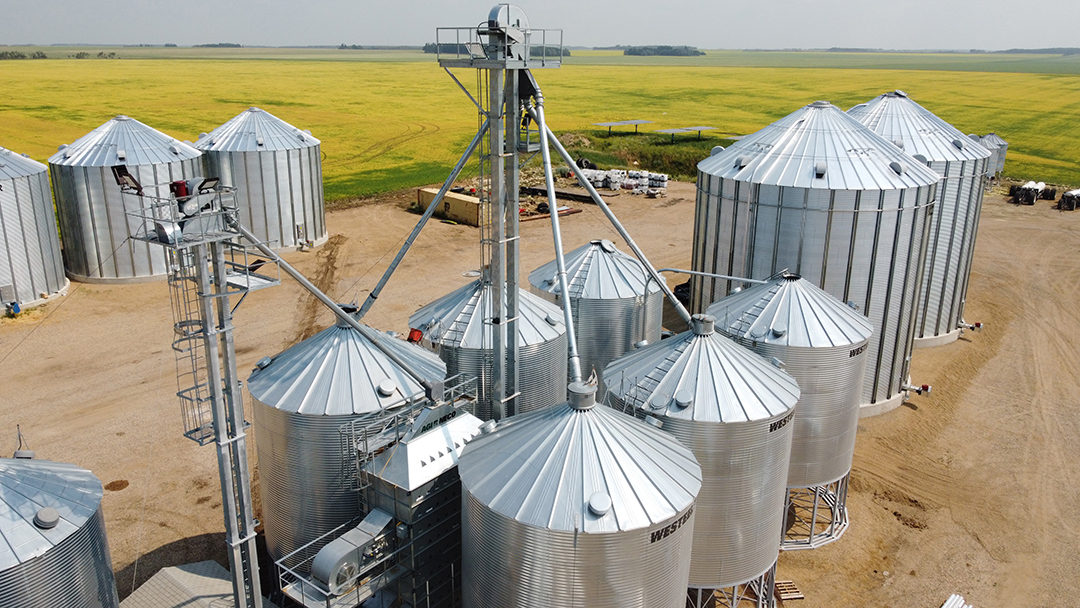
It may seem early to plan for harvest, but summer is a great time to build your bins and install your grain handling equipment to move the crop come harvest time. Buying now will ensure your equipment is installed and ready to go in the fall – so you can have peace of mind all season long....
Posted by Calla Simpson on Jun 24, 2022 in Ag news
Tagged Grain Systems, Grain Handling, Grain Drying, Grain Cleaning, Turnkey, Bin Site, NECO, Walinga
Why You Should Choose Flaman for Your Next Custom Screen Project
Flaman Grain Systems is Western Canada’s largest custom screen manufacturer.
Not only do we stock over 50 varieties of material for any type of screen you may need, but we also have a team with over 50 years of combined experience in the Grain Systems industry....
Posted by Calla Simpson on Mar 18, 2022 in Division News
Tagged Grain Systems, Grain Cleaning, Grain Cleaners, Screen Manufacturing, Perforated Screens, Custom Screens, Processing Plants
From start to finish, the Flaman Grain Systems team is right beside you
At Flaman, we understand that investing in your farming operation and expanding your yard site is important for continued growth and efficiency. That’s why we believe in supporting you from start to finish. ...
Posted by Mitch Flaman on Apr 7, 2021 in Division News
Tagged Grain Systems, Grain Handling, Grain Drying, Grain Cleaning, Optimization, Site Drawings, Yard Planning
From start to finish, the Flaman Grain Systems team is right beside you
At Flaman, we understand that investing in your farming operation and expanding your yard site is important for continued growth and efficiency. That’s why we believe in supporting you from start to finish. ...
Posted by Mitch Flaman on Apr 7, 2021 in Division News
Tagged Grain Systems, Grain Handling, Grain Drying, Grain Cleaning, Optimization, Site Drawings, Yard Planning
Be ready for harvest 2020: Summer is the time to build your bins & install your grain handling equipment
As seeding is coming to a close throughout the province, you may be starting to think about the next steps in your farming operation for 2020. This likely includes thoughts of additional Grain Storage, Grain Handling, and even Grain Drying equipment.
It may seem early to plan for harvest, but summer is a great time to build your bins and install your grain handling equipment to move the crop come harvest time. Buying now will ensure your equipment is installed and ready to go in the fall – so you can have peace of mind all season long....
Posted by Calla Simpson on May 29, 2020 in Ag news
Tagged Grain Systems, Grain Handling, Grain Drying, Grain Cleaning, Turnkey, Bin Site, NECO, Walinga
The secret behind cleaning grain with indent cylinder machines
The indent cylinder machine is designed primarily to separate grain by kernel length. It separates long kernels from shorter ones. The cylinder itself is a thin-walled tube with indents formed on the inside to the shape of a hemisphere. These indents are known as pockets....
Posted by Roy Ritchie on Aug 22, 2012 in Product Information
Tagged Grain Cleaning, Indent Cylinder, Grain Kernel, Flaman, Grain Sorting
Operation of a Air Screen Grain Cleaner
Operation of an Air and Screen
As the name implies, air screen machines use a combination of suction air that is drawn through the curtain of grain as it falls from the hopper onto a series of screens. The screens then size the product by width of the kernel, and a final air suction process is used....
Posted by Roy Ritchie on Jan 27, 2012 in Product Information
Tagged Grain Cleaning And Handling, Air Screen Grain Cleaner, Sieve, Sift, Scalf
What is Ergot?
Ergot is a type of fungus that grows on many grasses, rye, wheat, barley, and triticale.It infects the floret of the grass or cereal and mimics the process of pollinated grain growing on the plant. On ergot infected plants, a spore destroys the ovary, and then connects to the plant by attaching itself to the plant’s seed nutrition system. An infected floret can also infect other florets by insect dispersal of the asexual spores. That means that an insect can carry millions of the spores to other plants in the region. When mature ergot drops to the ground the fungus remains dormant until proper conditions trigger its fruiting phase, germinate and re-infest an area....
Posted by Roy Ritchie on Dec 12, 2011 in Product Information







